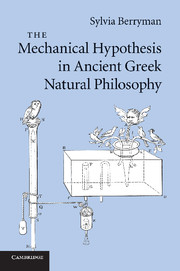Book contents
- Frontmatter
- Contents
- List of illustrations
- Acknowledgements
- Introduction
- 1 Mechanics and the mechanical: some problems of terminology
- 2 ‘Mechanistic’ thought before mechanics?
- 3 Mechanics in the fourth century
- 4 The theory and practice of ancient Greek mechanics
- 5 Ancient Greek mechanics continued: the case of pneumatics
- 6 The philosophical reception of mechanics in antiquity
- Conclusion
- Appendix: Ancient mechanics and the mechanical in the seventeenth century
- Bibliography
- Index of passages
- General index
Introduction
Published online by Cambridge University Press: 24 December 2009
- Frontmatter
- Contents
- List of illustrations
- Acknowledgements
- Introduction
- 1 Mechanics and the mechanical: some problems of terminology
- 2 ‘Mechanistic’ thought before mechanics?
- 3 Mechanics in the fourth century
- 4 The theory and practice of ancient Greek mechanics
- 5 Ancient Greek mechanics continued: the case of pneumatics
- 6 The philosophical reception of mechanics in antiquity
- Conclusion
- Appendix: Ancient mechanics and the mechanical in the seventeenth century
- Bibliography
- Index of passages
- General index
Summary
Historians agree on the importance, both to natural philosophy and to the development of the modern sciences, of the emergence of a ‘mechanical world picture’: many have studied its history, defining features and governing motivations. One important reason for the development of this world picture in the early modern period seems to have been the reintroduction of a number of ancient Greek texts. Rose and Drake suggest that it is no coincidence that the circulation of the Aristotelian Mechanica coincided with the formative period for modern science.
Against this background, it might seem necessary to account for the absence of any comparable interest, amongst the ancient Greeks themselves, in the implications of their mechanics for natural philosophy. A number of classic explanations have been offered as to why ancient Greek thinkers might not have seen the applicability of ideas from mechanics to the understanding of the natural world. I suggest that these explanations are spurious, and moreover that there is evidence of a philosophical reception of ideas from mechanics, especially in late antiquity. The evidence is scattered and often only preserved in the criticisms of its detractors: the dominant figures in late antique philosophy rejected the ‘mechanical hypothesis’. But its very existence is an interesting development that should not be overlooked.
Ancient Greek mechanics was a broad and diverse field, including a number of subfields concerned with different kinds of ‘working artifacts’ and the theory of their operation.
- Type
- Chapter
- Information
- Publisher: Cambridge University PressPrint publication year: 2009
- 1
- Cited by

